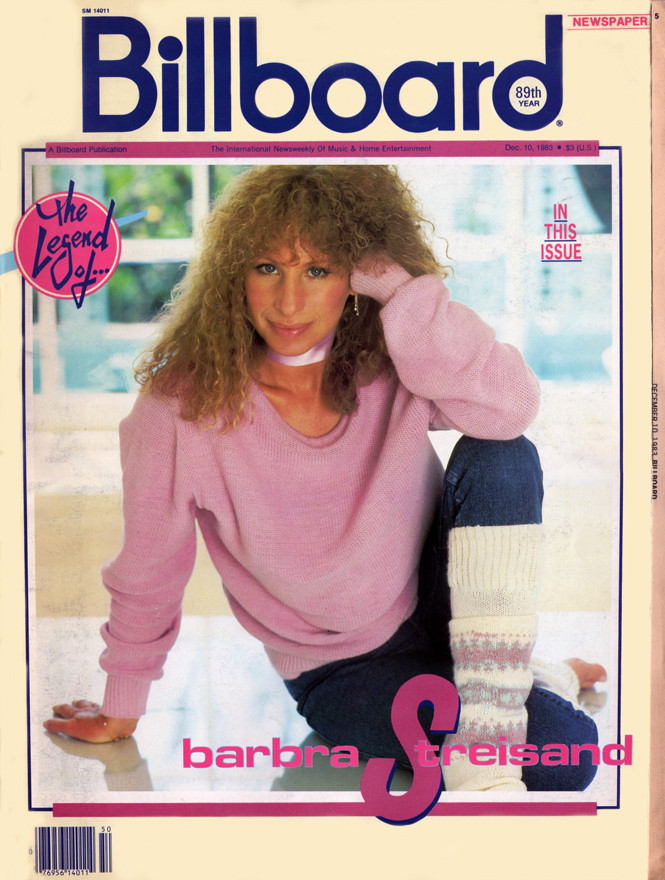
Billboard
December 10, 1983
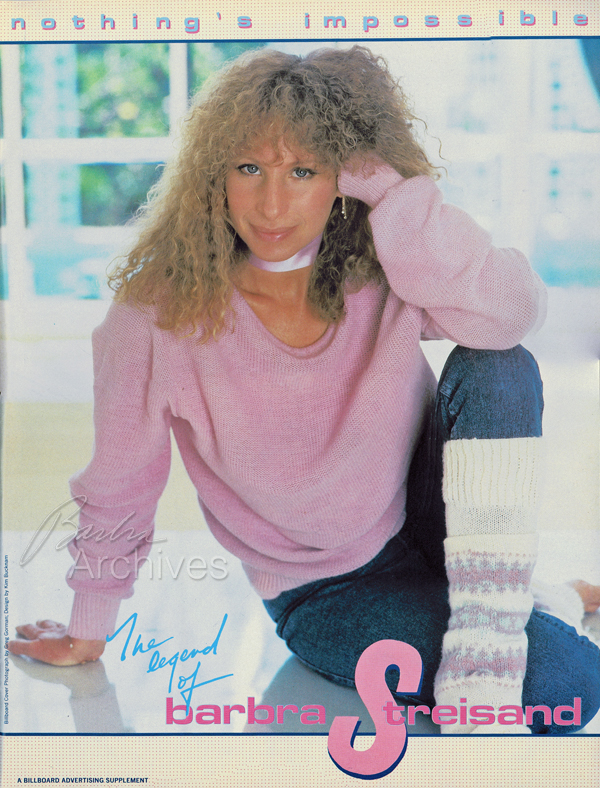
The Legend of Barbra Streisand
Credits: Special Issues Editor, Ed Ochs; Assistant Editor, Robyn Wells; Editorial Coordination, James Spada; Cover photograph by Greg Gorman; Cover design and layout, Kim Buckman.
Page 1 | Page 2 | Page 3 | Page 4 | Page 5
[Barbra-Archives Note: This issue of Billboard featured full-page tributes to Streisand, paid for by professional colleagues, friends, and associates in the film and recording industry. I've scanned and posted these pages here.]
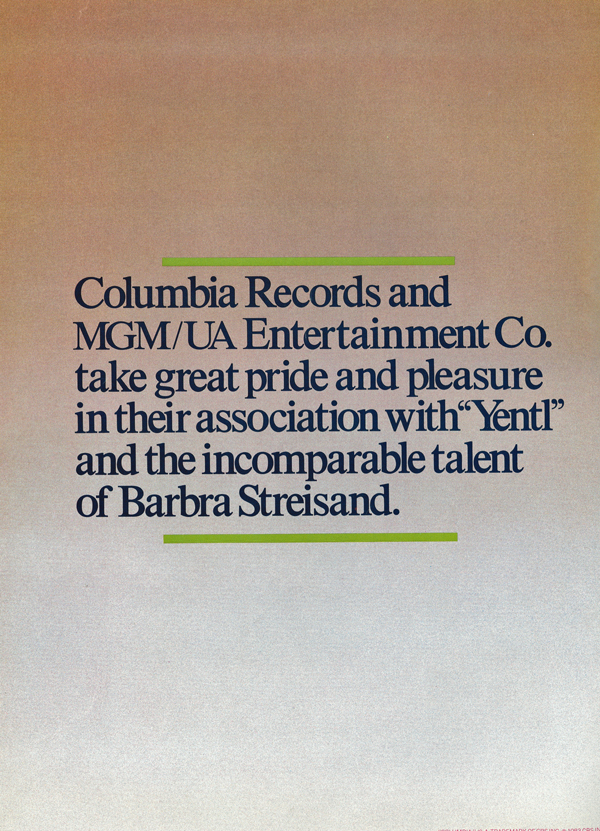
The Legend of Barbra Streisand: “Nothing's Impossible”
By James Spada
"Barbra Streisand's 'Yentl' is a triumph - a personal triumph for Streisand as producer, director, co-author and star, but also a triumphant piece of filmmaking. "
Arthur Knight, The Hollywood Reporter
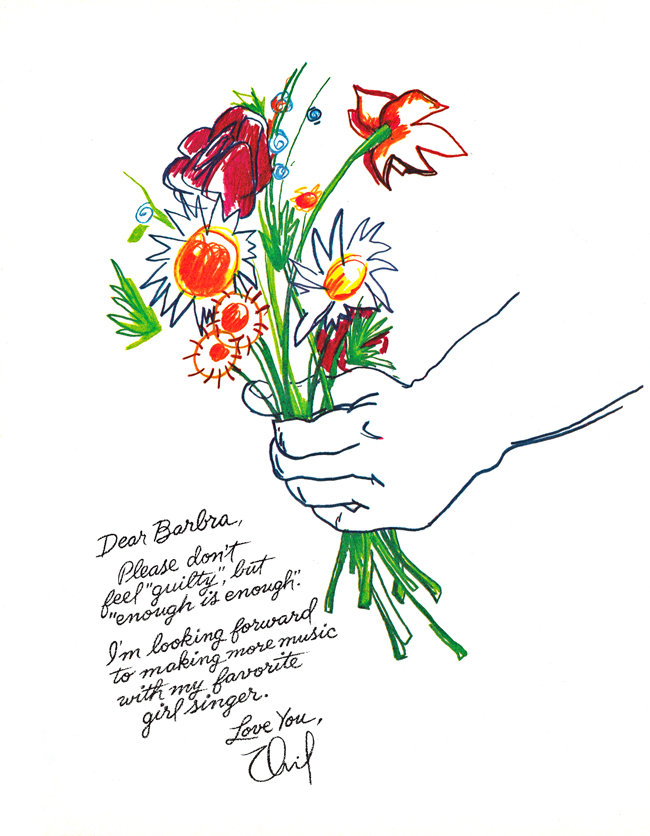
BARBRA STREISAND'S ENTIRE 23-YEAR CAREER IN SHOW business has been a series of triumphs, not only in the sense of successes-although there have been astonishing numbers of those-but in the triumph of will over adversity, of dedication to one's goals despite constant skepticism and denials. Streisand may seem to be a Golden Girl, gilding everything she touches-but her career has been a series of struggles that would have defeated many people without her strength of character. Indeed, to Barbra Streisand "Nothing's impossible."
Her longest and most frustrating struggle early in her career was to get a recording contract. Marty Erlichman, who was her personal manager from 1960 until 1976, remembers that every attempt to land her a contract had the same result: "Everybody said, 'She has a beautiful voice, but it's more Broadway than records, and certainly the voice and the material are not what is being bought at the moment. We don't think she'll sell records.' "
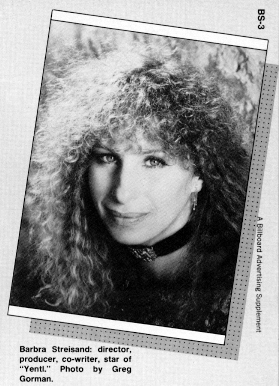
For more than a year, the turndowns continued. But by this time, mid-1961, Barbra Streisand was used to skepticism. Indeed, had she listened to everyone around her back in Brooklyn, she never would have tried to enter show business at all. She was laughed at when she announced her lofty ambition to be an actress-at this point she had given no thought to singing-and even her mother, trying to protect her daughter from pain, told her that she wasn't really pretty enough to be an actress and that there was more security in being a school secretary. It was certainly true at the time that she didn't look the part of a budding movie star. As a teenager, she was skinny, had a prominent nose and slightly crossed eyes. The kids in her neighborhood called her "Big Beak" and "Crazy Barbara." "All I heard," says Barbra, was 'No, no, can't be done.' But I desperately wanted to become an actress. I wanted to express my feelings."
She thought of herself as a misfit: "Whenever I tried to imagine my future, I ran into a blank wall. I couldn't see kids or a husband or a home. I couldn't imagine any of the normal things."
As she would so many times in the future, she rebelled against the negativism she encountered and vowed that she would achieve her desire. She left home, moved to Manhattan, and began making the rounds of auditions. It was a devestating experience. "I was usually abruptly dismissed," Barbra says. "People looked at me as though I were nuts. They wouldn't even let me read. How could they tell anything if they wouldn't let you read?"
After a year of such rejections, even Barbra Streisand's mettle was starting to ebb. She had practically no money.
Although she had not thought of working as a singer, some friends heard her vocalizing around the house and dared her to enter a talent contest at a Greenwich Village bar. When she heard that the winner would get a week's engagement plus free meals, she accepted the challenge. Needless to say, she won the contest.
A few months later, in May of 1960, she was appearing at the Bon Soir, a better known Village club, and it was there that Marty Erlichman saw her for the first time. "I had gone to see a comic I represented, who was the closing act of a four-act bill. Barbra was first. She sang five songs-—her entire repertoire—and she just mesmerized me. I got chills on all five songs. And everyone in the place was enchanted too—except for the rest of the people at my table, who were industry people. They started talking to each other in the middle of her first song. And one of them, an agent, said to me after the first number, 'Boy, that girl has a lot to learn—you don't open with a ballad!'
"That was a problem in Barbra's life," Erlichman continues. "and it probably still is. When you initiate, when you're different, most of the world is frightened of it and doesn't understand it."
Starting her set off with a ballad wasn't the only thing that set Barbra Streisand apart. She came out in a variety of "kooky" thrift-shop outfits-feather boas, dangling jewelry, black fish-net stockings, long red fingernails. She sang highly unusual material -- from "A Sleepin' Bee" to "Who's Afraid of the Big, Bad Wolf?"
And she sang her songs as if they were three-act plays, complete with grimaces, waving arms, choking sobs. There had never been anyone quite like her. In an age when soulless assembly-line singers were all the rage, Barbra Streisand seemed to many like someone from Mars. But of course, at the base of all of it all was that incredibly beautiful voice.
Erlichman saw tremendous potential in Streisand. Everyone, including her manager at the time, was telling her, as Erlichman puts it, "to change the nose, change the clothes, stop singing those cockamamy songs." When Marty asked her if she needed a manager, she asked him if he thought she should change anything about herself. When he said no, she told him he had a client.
Jeff Harris, who wrote and directed "Another Evening with Harry Stoones," an off-Broadway show in which Barbra was featured in 1961, recalls that "Marty Erlichman treated her from the first moment I saw both of them, as if she were the biggest star there ever was."
"I always treated Barbra like a star," Erlichman concurs, "not by giving her limousines, but by making decisions for her as if she were a star, not settling, but demanding the best treatment for her by everyone."
This unwillingness to settle on the part of Marty and Barbra is one of the most important —and interesting— aspects of her early career.
After she had scored a success on Broadway in her first show "I Can Get It For You Wholesale" in 1962, the recording industry began to take notice of her. "The record people started to come back," Erlichman said. "The first label that wanted to sign her was Atlantic. But that label was basically jazz, and I told them that I thought she had great potential as an album seller, and since Columbia was the best album-producing company, I had my heart set on them. I told Capitol the same thing.
"It was a difficult thing to do, turning down offers after we'd waited so long. And neither of us had much money. But we both thought that it would be better to hold out for the best than to jump at the first offer just because we were hungry."
"I wanted to produce her best-selling album, and I accomplished that. But to me, none of the songs on that album matcht he greatness of some of the songs she's done with the Bergmans, or 'People' or 'Evergreen'. I would love to work with her again. I have a lot of ideas for her, a lot of direction she could go in. I'm waiting for Charles Koppelman to call me.
"I have a message for Barbra: 'Sing proud.' She'll know what I mean."
— Barry Gibb, Producer/Songwriter, "Guilty"
Goddard Lieberson, head of Columbia Records, had turned Streisand down a year earlier, sending her "a lovely note" explaining that she had a beautiful voice but he just didn't see commercial potential there. He became aware of the attention she was getting in "Wholesale," and worked with her on the Original Cast recording of the show. He went to see her at the Bon Soir and was tremendously impressed by the strong audience reaction to her. "Goddard called me," Erlichman remembers, and said, 'it takes a big man to admit a mistake, and I believe I made a mistake. I would like to record Barbra."
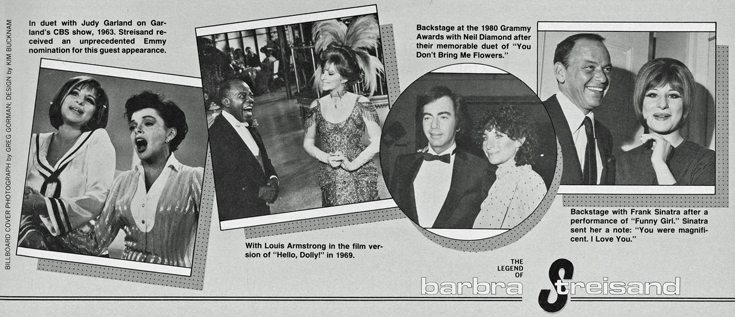
So Barbra Streisand, finally, had a recording contract. Not only that, but it was a contract that guaranteed her creative control over her material and also guaranteed that Columbia would release as well as record her product. These were rare concessions. How had Streisand managed to obtain such contract points when not too much earlier Columbia didn't even want to sign her?
[ top of page ]
